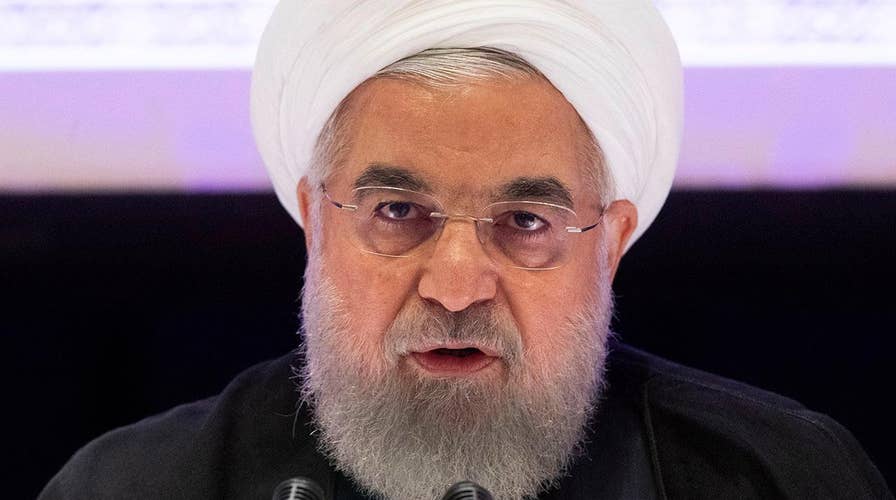Eric Shawn: Pres. Trump’s Iran sanctions ‘are working’
Fmr. Rep. Chris Gibson says pressure will force the regime back to the table.
It has now been almost 18 months since Secretary of State Mike Pompeo issued 12 demands to Iran and imposed a “maximum pressure” campaign to compel Tehran to change behavior.
Critics are incorrect to say pressure against Iran cannot work: Overwhelming pressure and diplomatic isolation forced revolutionary leader Ayatollah Ruhollah Khomeini to release American hostages. Then, in 1988, he accepted a ceasefire in the Iraq-Iran War — likening it to drinking “from a chalice of poison” because the financial toll of unending war had grown too great to bear.
To some degree, the “maximum pressure” campaign has also been successful. Ordinary Iranians feel the pressure. Despite their promises to the contrary, neither European, Russian nor Chinese partners have meaningfully come to Iran’s assistance. The country remains diplomatically isolated.
NEWT GINGRICH: CHINA-RUSSIA MILITARY ALLIANCE WOULD HAVE INCREDIBLE IMPACT ON US
Still, if any pressure campaign is to fully succeed, the Trump administration must remember what every president from Jimmy Carter to George W. Bush understood: The Iranian public and the Islamic Republic are not synonymous.
A 2012 survey conducted by Israeli political strategist Yuval Porat found that the Iranian society’s potential for liberal democracy exceeded countries like South Korea, India, Ukraine, and Romania. Coercion must target the Islamic regime, but not its people. Put another way, if the U.S. goal is to hobble or change Iran’s revolutionary regime, it is essential to empower the Iranian people rather than repress then. The former promotes freedom; the latter allows the Islamic Republic’s leadership to rally the public around the flag.
CLICK HERE TO SIGN UP FOR OUR OPINION NEWSLETTER
A case in point where “maximum pressure” goes wrong is the broader 2017 travel ban which today restricts visas for Iranians and citizens of seven other countries. While Pompeo was wise to restrict U.S. visas for relatives of regime officials and to limit movement of Iranian diplomats in New York, the broader ban is demonstrably counterproductive. It undercuts the effectiveness of the Trump administration’s outreach to Iranian oppositionists at home and abroad.
More from Opinion
According to a survey by Public Affairs Alliance of Iranian-Americans (PAAIA) — the largest grassroots Iranian American political organization — more than three-quarters of Iranian Americans say they oppose the ban. More than half of Iranian Americans, meanwhile, say that the policy has prevented attendance at family events like weddings, funerals, graduations or attending to relatives’ health emergencies.
Maximum pressure could bring down the regime, but it could also snatch defeat from the jaws of victory.
While Trump has been unable to show how the ban has advanced its goals, the policy hemorrhages Iranian goodwill and undercuts U.S. messaging in a country where almost 40 percent — 32 million people — are under 25, educated, and hold a positive disposition toward America.
Rather than bludgeon Iranians, an effective pressure campaign would seek to drive a wedge between ordinary Iranians and their government. Reformism is not the answer. Not only do reformist politicians remain loyal to the theocracy, but they are also its fig leaves: While they hold out hope for gradual reform, they will never control the deep state institutions necessary to implement it.
While Trump prefers to wield an axe, a scalpel would be more effective. A wiser regimen would fund trade unions — something progressives should be able to get behind — to simultaneously empower ordinary Iranians while forcing the regime to divert money away from weapons programs and proxy groups.
Or, perhaps Defense Secretary Mark Esper could send hospital ships to Dubai and offer Iranian military veterans free health care. If they accept, it would be a propaganda (and perhaps intelligence) coup. If Iranian leaders restrict their travel, it will demoralize Iranian officers. After all, there can be no regime change without first splintering the Revolutionary Guards.
CLICK HERE TO GET THE FOX NEWS APP
Maximum pressure could bring down the regime, but it could also snatch defeat from the jaws of victory. In Iraq, maximum pressure crippled the economy to such an extent that, more than 16 years after regime change, the now-allied government still struggles to overcome its impact.
What Iran needs is not maximum pressure, but smart pressure: Trump and Pompeo should wield a big stick against the regime, but if they seek positive change, then they also must both simultaneously shield the Iranian public from its bruises and perhaps even offer independent Iranian civil society some carrots.

